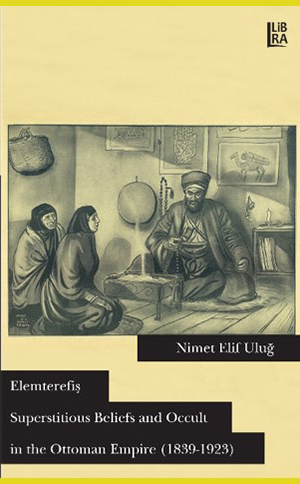
This book is about the social history of superstitious beliefs and especially magic and sorcery. I mainly tried to examine how superstitious beliefs and magic transformed the daily life of the Ottoman Empire into a world of superstitions in the nineteenth century. However, I had to go further back when I deepened my research into the origin of superstitious beliefs and magic seen in almost every period of the Ottoman Empire. I looked at polytheistic religions like shamanism, Animism, Manichaenism, Buddhism and Hinduism, which were the common religious beliefs of the former Turkish world. I included various other pagan religions and cultures underlying the past of the Ottoman geography over three continents as well as Judaism, Zoroastrianism, Christianity, the Sky God belief in Central Asia and finally Islam. .
In the Ottoman Empire, “professional” magicians were of the ulema class who were not reluctant to utilize religious knowledge for their personal interests. In fact, they began to live immorally; “amateur” magicians were composed of occult groups, a.k.a. pseudo-clergy. I followed magic and magicians included in the documents of the Prime Ministry Ottoman State Archives only as they were caught as a result of a complaint. Füsun and Efsun, daughters of Cinci Arif Hoca, and their story add local and authentic flavor to the points made in the book.
Künye
Kitabın Adı: |
Elemterefiş: Superstitious Beliefs and Occult in the Ottoman Empire (1839 - 1923) |
Yazan: |
|
Baskı tarihi |
2016 |
Dizi Adı: |
History - 139 |
Baskı Adedi: |
100 |
Sayfa: |
522 |
Ebat: |
13,5 x 21 |
Kağıt: |
Enzo 60gr. |
Kapak: |
Lom Tasarım Ofisi |
Cilt/Kapak: |
250 gr. Mat, Amerikan Bristol, 4 renk |
ISBN/Barkod: |
978-605-9022-60-6 |
İçindekiler
Road Map of the Study
CHAPTER I - SUPERSTITIOUS BELIEFS AND OCCULT BEFORE ISLAM
What is Magic?
Animism
Shamanism
Prayer for Rainfall (Yağmur Duası)
Polytheism
Judaism
Christianity
CHAPTER II - SUPERSTITIOUS BELIEFS AND OCCULT IN THE PRE-OTTOMAN ISLAM
"Magic" in Islamic Literature
The Concept of Satan in Islam
The Koran and the Djinn
Was Prophet Mohammed Subjected to Magic?
The Djinn in Hadiths
Magic in Islam: Does it exist or not?
Prayer and Incantation in Islam
Conclusion
CHAPTER III - SUPERSTITIOUS BELIEFS AND OCCULT IN THE OTTOMAN EMPIRE (1299-1839)
Introduction
Anatolian or Rumelian Saints
Tradition of Menakıpname
Anatolian Evliya Tradition
The Byzantine Effect
Beliefs Brought from Central Asia
Thesis, Anti-thesis, Synthesis
Effect of Sufism
Conquest of İstanbul: From Seigniory to Empire
Superstition and Magic in Public Religion Books
Ottoman Books on Fortune-Telling and Occult
Occult Language: muska, tılsım, hamayıl, havas, vefk...
Tılsım and Hamayil
Figures and Symbols
Palace Magic: Talisman Shirts
Havass and Vefk
Vefk
Talisman Shirts and Magic in the Ottoman Palace
Ottoman Sultans, Casting Magic and Having Magic Cast
Conclusion
CHAPTER IV - SUPERSTITIOUS BELIEFS AND OCCULT IN THE NINETEENTH-CENTURY MODERN OTTOMAN SOCIETY (1839-1923)
Introduction
Ulema, Pseudo-Ulema
Sultan Abdülhamid II and Monopolization of Islam
Hüddamlı Hocas
Muska and Tılsım
Public Islam
Modernization of the Shari'ah
Conclusion
CHAPTER V - MEDIA BEFORE MEDIA: SUPERSTITIOUS BELIEFS AND OCCULT IN TANZİMAT NOVELS
Novels: An Overview of the Ottoman Society
Dualism Everywhere
Novels: As a Modernization Instrument
From Positivism to Modernism
Superstitious Beliefs and Magic in Tanzimat Era Novels
Hace-i Evvel: Ahmet Mithat Efendi
A Writer against All Superstitions: Hüseyin Rahmi Gürpınar
Superstitious Beliefs in Ömer Seyfettin's Short Stories
Another Side ofHalide Edip Adıvar
And the Others
Conclusion
CHAPTER VI - THE TALE OF FÜSÛN AND EFSÛN
Preamble
Well, I Cannot Make This Undone
"The Things We Live Through" v
The Mysterious Treasure Chest of My Father
Writing Brings about More Writing
I Utterly Repent Having Written It!
Epilog
CONCLUSION
APPENDICES
BIBLIOGRAPHY
INDEX

